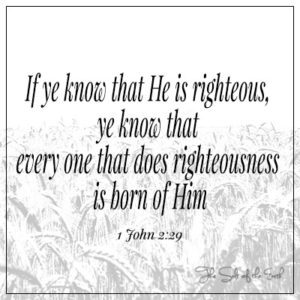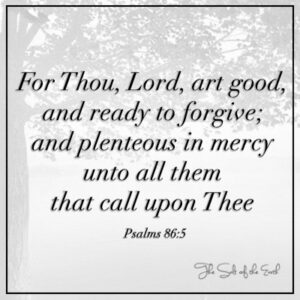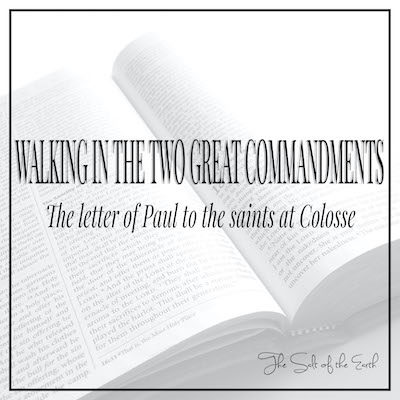Kolosay 3:12-14, Paul wrote about what the elect of God should put on. Bawlos ayaa qoray, put on therefore, as the elect of God, holy and beloved, bowels of mercies, kindness, humbleness of mind, meekness, longsuffering; Forbearing one another, and forgiving one another, if any man have a quarrel against any: even as Christ forgave you, so also do ye. And above all these things put on charity, which is the bond of perfectness. Maxay tani ka dhigan tahay?
The new man represents the Kingdom of God on earth
If you believe in Jesus Christ and have been born again in Christ, you have been transferred from the darkness into the light and you no longer belong to the world, but the Kingdom of God. You have become the new man; born of God and your love doesn’t go out to yourself and the world anymore, but to God and the Kingdom of Heaven (ku. John 3:5; 12:36, Efesos 4:17-24; 5:8-10, Kolosay 1:12-14; 3:1-4, 1 John 5:4-5).
Sida wiil Ilaah (tani waxay khusaysaa lab iyo dheddig labadaba) and a citizen of the Kingdom of God, where Jesus is King and reigns, you shall represent this Kingdom on earth.
You have been appointed by God as an ambassador of His Kingdom and shall represent the law of the Spirit of life in Christ Jesus that is written upon your new heart by the Holy Spirit, Who abides in you.
Your nature has changed through regeneration in Christ and therefore you shall no longer live as the old man (fallen man) and walk and react as a disobedient child, who has the devil as father and belongs to the world.
You shall put off the old man and his deeds and put on the new man, who is renewed in the knowledge of Him that created him. You shall walk as an obedient child, who is reconciled with God through Jesus Christ and has God as Father and belongs to the Kingdom of Heaven.
What should the elect of God put on?
Put on therefore, as the elect of God, holy and beloved, bowels of mercies, kindness, humbleness of mind, meekness, longsuffering (Kolosay 3:12)
As the elect of God, holy and beloved, you shall put on the new man and walk worthy of the Lord and clothe yourself with
- Bowels of mercies (compassions, tender mercy, inward affection, and mercy)
- Kindness (usefulness, that is moral excellence (in character and demeanor), gentleness, moral goodness integrity)
- Humbleness of mind (modesty, humility of mind, lowliness (of mind))
- Meekness (gentleness, by implication humility)
- Longsuffering (forbearance, fortitude: longsuffering, patience)*
These characteristics are part of the fruit of the Spirit and show that you are born of God and belong to Him. Because just as God is full of compassion, merciful, kind, meek, and longsuffering, so should his sons be and walk in it (ku. Galatiya 5:22, Efesos 4:1-3; 5:8-9)
Forbear and forgive one another
Forbearing one another, and forgiving one another, if any man have a quarrel against any: even as Christ forgave you, so also do ye (Kolosay 3:13)
The saints in Christ shall forbear one another, despite the fact that everyone is different.
It happens quite often that brothers and sisters in the church can’t go along with each other and are angry with each other and live in unforgiveness.
But Paul commanded the saints to be patient and forbear one another and to forgive one another, if any man has a quarrel against any.
When someone disappoints you, treats you wrongly, or says or does something that might offend or hurt you, you shall forgive the person, just like your Father from Whom you are born, and just like Christ, Who has forgiven you, when you repented and asked forgiveness (ku. Baxniintii 34:6-7, Tirooyinka 14:18, Sabuurrada 86:5; 103:2-3, Roomaanka 3:24-26, Efesos 1:7; 4:32, Kolosay 2:13, 1 John 1:9).
You shall not be led by unforgiveness, bitterness, and hate, but you shall forgive and let go, so that you will be let go off (Sidoo kale akhri: What is the secret of forgiveness?).
Put on charity (jacayl), which is the bond of perfectness
And above all these things put on charity, which is the bond of perfectness. (Kolosay 3:14)
And above all these things, you shall put on charity (jacayl) which is the bond of perfectness (moral and spiritual maturity). It is the binding factor that keeps everything together (complete) both ‘the members’ of the new man as the members of the Church.
The Bible doesn’t refer to the love of the world, which is a selfish and humanistic love, wherein the people are the center and wherein the disobedient children of the darkness walk in and whereby the works of darkness are accepted.
But the Bible refers to God’s love, which is produced in the heart of every born-again believer, who belongs to God and is completely devoted to God.
The love of God is a self-denying and (self-) sacrificial love, which sacrifices everything, including ‘self’ for the sake of Jesus Christ; Erayga nool, and the beloved Son of God.
This love loves God above all and everyone and yields to God and His Word and obeys the words and commandments of God and Jesus Christ and is the highest authority in the lives of those, who are born of God and belong to Him.
This love is a fruit of the Spirit and loves righteousness and hates sin and iniquity and therefore this love shall never approve of sin.
If you walk in love, you shall submit to God and you shall obey His words and commandments and walk in righteousness after His will, whereby you shall prove that you really love Him and are in Him and abide in His love and that the Father and the Son by the Holy Spirit abide in you.
If ye love me, keep My commandments. And I will pray the Father, and He shall give you another Comforter, that He may abide with you for ever; Even the Spirit of truth; whom the world cannot receive, because it seeth Him not, neither knoweth Him: but ye know Him; for He dwelleth with you, and shall be in you (John 14:15-17)
Jesus answered and said unto him, If a man love Me, he will keep My words: and My Father will love him, and We will come unto him, and make our abode with him (John 14:23)
As the Father hath loved Me, so have I loved you: continue ye in My love. If ye keep My commandments, ye shall abide in My love; even as I have kept My Father’s commandments, and abide in His love (John 15:9-10)
O righteous Father, the world hath not known Thee: but I have known Thee, and these have known that Thou hast sent Me. And I have declared unto them Thy Name, and will declare it: that the love wherewith Thou hast loved Me may be in them, and I in them (John 17:25-26)
Loving your neighbour
Out of God’s love, which is poured out in your heart and wherewith you love God, you shall love your neighbour. This doesn’t mean that you become a wishy-washy and tolerate and approve all things, even dembi, which is walking in rebellion and disobedience to God and His Word in unbelief.
On the contrary, if you genuinely love your neighbour, you shall speak the truth of God and call your neighbour to repentance and to remove sin. Because you know that the works of the flesh are evil and reap corruption, leading to hell and the second death in the eternal lake of fire and not eternal life.
But loving your neighbour means, that you don’t lie to your neigbour, you don’t cheat on your neighbour, you don’t hurt your neigbour, you don’t commit fornication, you don’t commit adultery, you don’t covet your neighbour’s possession, you don’t steal from your neighbour, you shall not be jaleous and shall not envy your neighbour, you shall not hate and shall not kill your neighbour, and so on (Sidoo kale akhri: What does it mean to love your neighbour as yourself? iyo How do you establish the law?)
The elect of God, holy and beloved, walk in God’s love
The elect of God, holy and beloved, belong to God and walk in the righteous love of God, and not in the love of the world, and overcome evil by doing good.
Just like Jesus Christ, Who was full of the Holy Ghost and walked in obedience to God and overcame evil by doing good (although the good Jesus did was not always regarded by the world as good but as evil), and despite the persecutions continued to preach the Kingdom of God and the call to repentance and exposed and destroyed the works of darkness, culminating in the crucifixion and resurrection from the dead, with which Jesus conquered the devil and death and showed God His love for man once and for all
‘Noqo cusbada dhulka’
*Strong’s Concordance, Vine’s Expository Dictionary, Thayer





